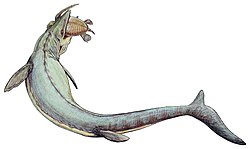Top Qs
Timeline
Chat
Perspective
Peedee Formation
Geological formation in the United States From Wikipedia, the free encyclopedia
Remove ads
The Peedee Formation is a geologic formation in North and South Carolina. A marine deposit representing an inner neritic environment,[2] named for exposures along the Great Peedee River, it preserves invertebrate (primarily belemnites, echinoderms and foraminifera) and vertebrate (primarily shark teeth, with some marine reptile remains) fossils dating to the Late Cretaceous (Maastrichtian).[1]
The formation is notable for its occurrence of Belemnitella americana, known as the Pee Dee Belemnite (PDB), a long-standing standard in stable carbon isotope research. A single pterosaur femur, possibly an Azhdarchid, from the Peedee formation is one of the few pterosaur body fossils found in Eastern North America.[3]
The stratigraphy of the formation spans from the early Maastrichtian (in South Carolina)[4] to the late Maastrichtian shortly before the Cretaceous-Paleogene extinction event. The formation is divided into several members, including the early-mid Maastrichtian Rocky Point Member and the late Maastrichtian Island Creek Member.[2] Based on its fauna, it appears to be roughly concurrent with the Navesink Formation from New Jersey.[3]
Remove ads
Vertebrate paleobiota
Summarize
Perspective
Cartilaginous fish
Based on Case et al. (2017):[2]
Sharks
Rays
Bony fish
Reptiles
Pterosaurs
Crocodilians
Turtles
Plesiosaurs
Mosasaurs
Remove ads
Invertebrate paleobiota
Summarize
Perspective
Echinoderms
Echinoids
Sea stars
Crinoids
The Peedee Formation preserves some of the latest-occurring remains of the Roveacrinida, an extinct order of minute, pelagic crinoids.[7]
Molluscs
Cephalopods
Remove ads
See also
References
External links
Wikiwand - on
Seamless Wikipedia browsing. On steroids.
Remove ads





































